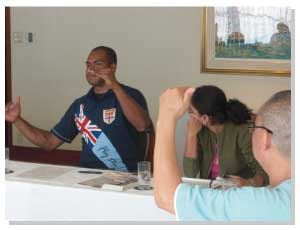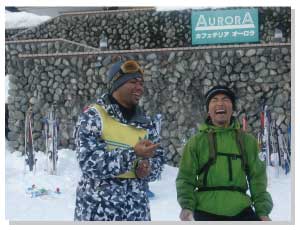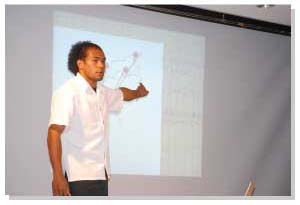- HOME
- Alumni News
- Michael Noa Bete Din (11th trainee)
- Noadin's Final Report
Noadin's Final Report
31st of September 2009, I arrived in Japan!!
When I arrived in Osaka, Japan, I saw many tall buildings. I was surprised and amazed. The following day, I met all the trainees from six different countries. We went to Duskin Headquarters to greet the Duskin staff members.
Japanese Language and Japanese Sign Language (three months)
When I first studied both Japanese language and Japanese Sign Language (JSL), I wanted to give up and return to my country, because the two languages were very difficult for me. But I kept trying. One day, I realized that it had become easy to use JSL, but the problem was writing Japanese. It was very difficult, but I now feel it is a bit easier to write some Japanese. Even though I have got used to written Japanese, I still prefer to use JSL to communicate with Japanese people.

The trainees
The five hearing trainees are now very good at Japanese Sign Language, because Arti from India and I communicated with them by using JSL almost every day. We went out for dinner together and talked a lot each other. So I don’t have any problem in terms of communicating with them in JSL.
Home-stay
At the end of December, 2009, I went to Hokkaido for a home-stay program. It was very cold and I saw a lot of snow. I was amazed to see a lot of snow because it never snows in my country, Fiji, and it was the first time I had ever seen snow. It was a great opportunity to touch and play with snow. My host father and I went skiing. At first, I was unable to ski, but my host father taught me how to do it. Eventually I was able to ski well. On the New Year’s Day, we went to a temple. There were many people praying for something…
Skiing
We trainees went to Echigo Yuzawa in Niigata Prefecture for ski training. The place we went to was very dangerous to ski- not like Hokkaido I had been. The staff members at the ski site helped us. They were great professionals and taught us how to ski. They taught how to turn right and/or left, so I felt as if I had become a very good skier!! I think I can beat Japanese Olympic athlete!! Ha-Ha…honestly, I wanted to stay there forever, because I had become a skilled skier.

Training in Japan
1. Deaf associations in Japan
I learned from Japanese deaf associations in different prefectures how my organization, Fiji Association of the Deaf, can be improved. I was amazed to learn there are many deaf associations in Japan. I went to Fukuoka, Okinawa and Tokyo to learn how Fiji Association of the Deaf could be developed. I spent most of my time in Japan learning about how to develop interpreters to improve communication for Deaf people, so I would like to study how to develop interpreters in the future.
2. Deaf schools in Japan
There are many Deaf schools in Japan. There are Deaf and hard of hearing students in most Japanese Deaf schools. Most of the students use simultaneous communication (sim-com), because in my view, teachers are not good signers. However it is much better times now, because in the past there was a time when use of sign language was prohibited. What impressed me most was Meisei Gakuen School for the Deaf. Not only the students but also the teachers at the school are very skilled in JSL. I thought that they signed better than at other deaf schools in Japan. At Meisei Gakuen School, I taught Fiji Sign Language (FJSL) to them. They got excited to communicate with me.
3. Japan Sign Language Interpreters
At Setagaya Welfare Professional Training College, I learned about training of sign language interpreters. There are a number of students in Japan who are learning sign languages, most of them women. At the college, there were approximately 40 students per class, and I was the only male in the class! It was very embarrassing. I was amazed by the students’ attitude towards sign language. In order to brush up their Japanese sign language skills, they came up to talk to me. Some of the students spent more than two hours to commute to school. They told me that it was very important to learn the sign language properly, and that the time required to come to school was not an issue at all.
I had always wanted to make an effort, back home, to train sign language interpreters. But I was quite shocked to see the difference in the levels of motivation between the Japanese students, and the people in Fiji who wanted to learn sign language. I can quite honestly say that currently in Fiji there is probably no one who wants to travel a long distance every day (to school) to learn sign languages. I thought that in Fiji, I would have to devise a way to train interpreters that matches Fiji’s situation.
Three year plan—training of more sign language translators--
I formulated a three-year plan, to develop and train sign language interpreters, and to create a system where the interpreters can work. First, I will open a school to train sign language interpreters in the capital of Suva. I will use newspaper ads to recruit students from various regions of Fiji, who are interested in sign language. The school will have a three-year course. Once graduated, the student will go back to their hometown, and create a system locally where sign language interpreters can be called for work. There are Deaf people everywhere in Fiji who need sign language interpreters. The training school will be in Suva, but I would like to create a system where Deaf people in Fiji can access sign language interpretation service irrespective of where they live.
The important part of my plan is to develop a system for sign language interpreter services concurrently with the training. In the first year, I would like to visit the Ministry of Education and a variety of schools to tell them the importance of sign language interpreters. For example, if sign language interpreter services can be organized systematically, inclusion of Deaf students in local schools will be possible. In the second year, I will launch activities to raise funds to organize and manage the system. I will negotiate with the Ministry of Education, and other ministries including the Ministry of Social Affairs. In the third year, the advanced leve of the sign language interpreter training-- I will start working on delivering the sign language interpreter services. I will talk to high schools and Deaf associations to hire full-time sign language interpreters so that sign language interpretation service will always be available at these schools and associations. I will work hard to bring this plan into action. I would also like to humbly ask for your help.
| Sign language interpreter training (school) | Creating a system for sign language interpreters | |
|---|---|---|
| 2011 | Beginner’s class | Awareness activities for sign language interpreters ・Ministry of Education ・Schools (primary – high schools) |
| 2012 | Intermediate class | Fund-raising negotiations ・Ministry of Education ・Ministry of Social Affairs |
| 2013 | Advanced class | Sign language interpreter assignment ・High schools all across Fiji ・Fiji Association of the Deaf |
Conclusion
I would like to thank the Duskin staff members of Duskin Ainowa Foundation and the staff of Japanese Society for Rehabilitation of Persons with Disabilities who always supported me during the training. Because of the training, I managed to acquire knowledge and experience needed to improve the lives of Deaf people in Fiji, and to further the development of Fiji’s Deaf association. Once again, I would like to say thank you so much for your support and generosity.
Missing you a lot…





